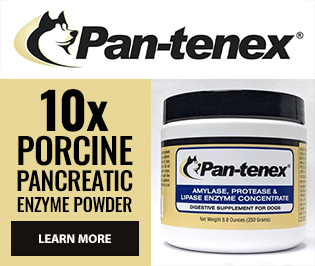When it comes to supporting your dog’s digestive health, fiber is often overlooked. But getting the right balance of fiber can play a big part in stool consistency, gut movement, and nutrient absorption, especially for dogs who need enzyme support.
Different Types of Fiber and What They Do
Not all fiber works the same. In dog nutrition, there are two main types:
- Soluble fiber dissolves in water, slows digestion, and helps ease diarrhea.
- Insoluble fiber adds bulk to stool and supports regular bowel movements.
Together, they influence how food travels through your dog’s digestive system and how well nutrients are absorbed.
Too Much Fiber Can Interfere with Enzyme Supplements
Dogs that rely on digestive enzyme powder, such as those with chronic loose stool, or absorption issues, can be especially sensitive to fiber levels. Excess fiber may bind to nutrients or move food through the gut too quickly, which limits how well enzymes like Pan-tenex can do their job.
If your dog is on an enzyme regimen and still experiencing soft stool or inconsistent digestion, their fiber intake could be part of the problem. You can track patterns in stool quality and digestion using our printable Dog Enzyme Digestive Health Stool Tracker.
What to Look for in Dog Food
Some commercial dog foods contain excessive fiber from fillers like beet pulp, oat bran, or soy hulls. While these ingredients may not be harmful in small amounts, dogs with digestive issues often do better on diets with low to moderate fiber.
Check the guaranteed analysis on your dog’s food. A crude fiber content of under 5 percent is typically better for enzyme-dependent dogs. For more guidance, see our article on low-fiber diets for dogs using digestive enzymes.
Signs That Fiber Might Be an Issue
Your dog may benefit from adjusting their fiber intake if you notice:
- Frequent soft or loose stool
- Gassiness or bloating
- Inconsistent appetite
- Straining during bowel movements
These symptoms do not always point to fiber alone, but they are worth investigating if your dog is already using enzymes correctly. You may also want to review Loose Stool in Dogs: What It Means & How to Help for additional insight.
Talk to Your Vet Before Making Changes
Always consult your veterinarian before switching foods or adjusting fiber levels, especially if your dog is on a therapeutic diet or managing an enzyme-related condition. Your vet can help guide the right balance of nutrients based on your dog’s diagnosis and overall health needs.
If you are not sure how fiber may be affecting your dog’s digestion or how to combine it with enzyme support, contact us. We are happy to help you figure out what makes the most sense for your dog’s situation.

